If you’ve been a cat owner for a while, then you’ve probably noticed how your pet loves stalking and even devouring live prey.
This can cause a lot of trouble if your feline friend accidentally munches on something poisonous.
This is why many people wonder “do cats eat frogs?”.
The answer is yes, and although most frogs outside tropical climates are rarely a threat, certain toads can be deadly toxic.
Keep reading for more information on the topic.
Contents
Do Cats Eat Frogs?
As gross as it sounds, cats do eat frogs if the opportunity presents itself.
That’s right, frogs are another entry on the long list of small animals that your cat has no problem chasing and eating, such as mice, bunnies, and birds.

You can’t really your cat for getting intrigued by a hopping frog more than you can blame it for hunting a mouse — it’s simply natural.
A frog that’s hopping around makes for an interesting pursuit, and boy do cats love a good chase.
Unfortunately, there’s a chance that your cat may become sick if it eats a frog.
However, you can’t stop a cat that goes outside from sticking its paws into prey, even it’s a little more “exotic” than usual.
Do Cats Attack Frogs?
Once again, the answer is yes, cats do attack frogs.
It’s not like your feline friend has a vendetta against the slimy animal; it’s just the same as when your cat goes outside and hunts critters, but instead of a “conventional” bird of mouse, a frog happens to cross its path.
If the frog is somewhere near water, your cat may be swayed to stay away, but if the frog is hopping around the grass in your yard, you can bet that your cat will make a move.
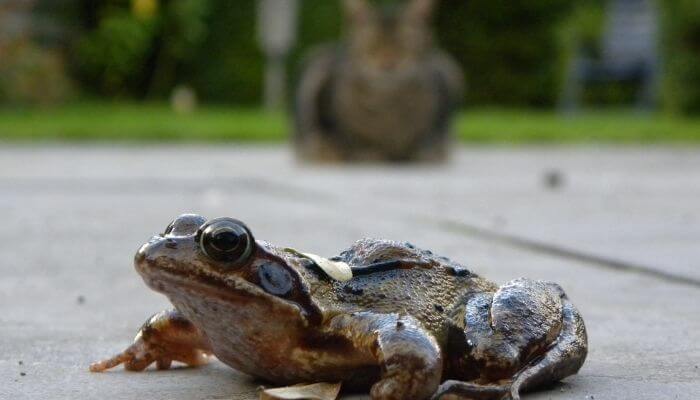
If you really think about it, frogs are pretty similar to birds or mice from a cat’s perspective.
Of course, it’s an entirely different animal, but they’re also small, move quickly, and make noise.
If you know the first thing about cats, then you understand how an animal that fits such criteria can easily pique a cat’s interest.
Not to mention, all the hopping deems frogs as great “cat toys”.
What Happens If a Cat Licks a Frog?
Luckily, licking a frog isn’t a health hazard for cats. It’ll gross you out, sure, but a lick won’t poison or harm your cat.
If your cat gets in a quick swipe of the tongue against a frog, there’s nothing to worry about as neither the cat nor the frog will be hurt.
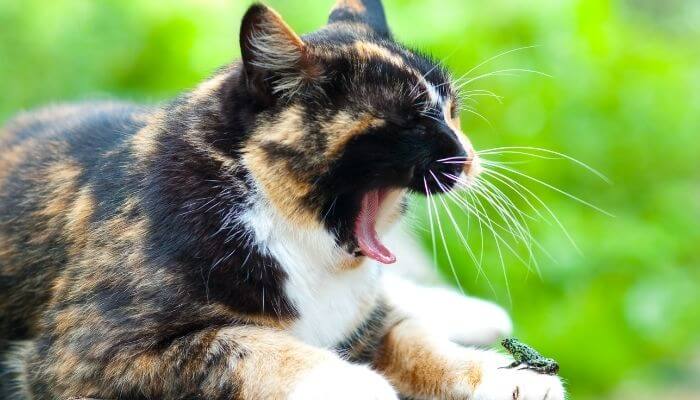
Your feline pet will just pick up some of the slim off of the frog’s back, but that’s about it.
It’s far from a pleasant sight, but the good news is that even if the frog or toad was poisonous, the skin on their backs isn’t where the danger lies — ingesting a poisonous frog or toad is.
As far as your cat licking a frog goes, the worst-case scenario is denying kisses for your cat once it’s back inside the house.
Are Frogs Poisonous to Cats?
There are no toxic frogs in the United States. So, if your cat happens to eat a frog, it’s probably going to be fine.
There are, however, a lot of toxic frogs in tropical regions and the rainforest which are very easy to tell apart from non-toxic frogs.
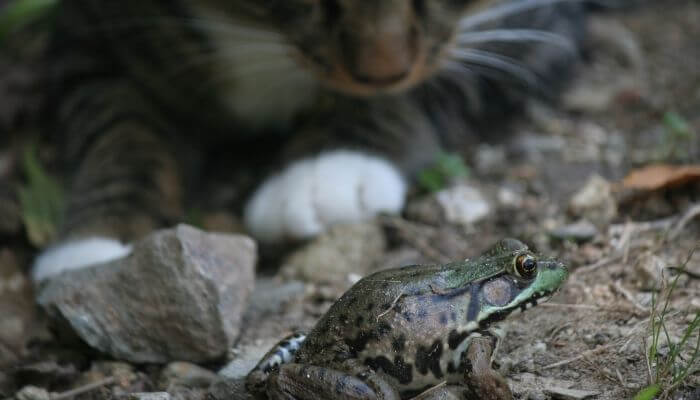
Poison dart frogs, for example, have brightly colored skin that comes in a range of fluorescent yellows, blues, and reds with black or white spots or strips.
They can also be green, but a seriously bright green at that.
Outside tropical regions, such frogs are mainly found in zoos. If your pet eats a frog, chances are it’s a run-of-the-mill species.
Are Toads Poisonous to Cats?
While frogs aren’t poisonous to cats, toads could be. It’s a long shot, but a possibility nevertheless.
When you imagine frogs, you probably visualize them having wet, slippery skin and long hind legs. You’d be right, but what about toads?
Often confused with frogs, toads have dry skin and short hind legs. This is important to keep in mind to avoid misidentification.
A couple of toxic toads can be found in the United States & United Kingdom:
- The Colorado River toad (Bufo alvarius).
- The cane toad (Bufo marinus).
Unlike toxic frogs, toxic toads don’t look the part. They’re mostly green or brown, which is very similar to run-of-the-mill toads.
In general, animals including cats will steer away from toads as they secrete mucus through their skin that’s not quite appetizing.
But the two toxic species we mentioned above secrete something extra; a milky-white venom that can paralyze or kill a cat with just a few drops.
Symptoms of toad poisoning usually manifest within seconds of the toad encounter. These include:
- Crying or vocalization of pain
- Pawing at the mouth and/or eyes
- Change in the color of membranes of the mouth
- Excessive drooling of saliva from the mouth
- High temperature
- Difficulty in breathing
- Erratic movements
- Seizures
- Collapse
What Should I Do If My Cat Eats a Frog?
If your cat eats a frog and you’re sure it’s not a toad, you don’t need to take drastic measures because your cat will be fine.
It may throw up afterward, but this is because of the change in its diet, not because the frog is poisonous.
You see, cats’ digestive systems aren’t equipped to handle frogs well.
Since these slippery animals aren’t easily digestible to cats, their stomachs will reject them soon after ingestion.
What you can do when this happens is give your feline pet plenty of water and a break for eating its normal food to reduce the risk of more vomiting.
Also Read: Can Cats Eat Lizards?
What Should I Do If My Cat Eats a Toad?
If your cat looks sick or you suspect toad poisoning, visit your vet or call a poison control hotline immediately.
If possible, flush your pet’s mouth with water for 5 to 10 minutes to avoid further absorption of toxins.
How to Stop Your Cat from Eating Frogs
Keeping your cat away from frogs is the best way to prevent them from eating the slimy creatures.
Even if you live near water, there are ways to stop your feline friend from frog hunting.
Here are some things you can try:
- Keep an eye on your cat during its time outside. If your cat gets too close, you can stop it before the feast.
- Don’t allow standing water in your yard. Such bodies of water, even if small, can serve as attraction spots for frogs.
- Don’t let your cat outside the house. If you have a small pond on your property, the best way to prevent your cat from eating frogs is to keep it inside.
- If possible, relocate the frogs. If you live near a small body of water, there may be a frog or two living out there. You can move them someplace where they’ll be less likely to get eaten.
Wrap Up
So do cats eat frogs?
Yes, they do.
Unless your cat encounters a toad, you have nothing to worry about as frogs in the US & UK aren’t poisonous.

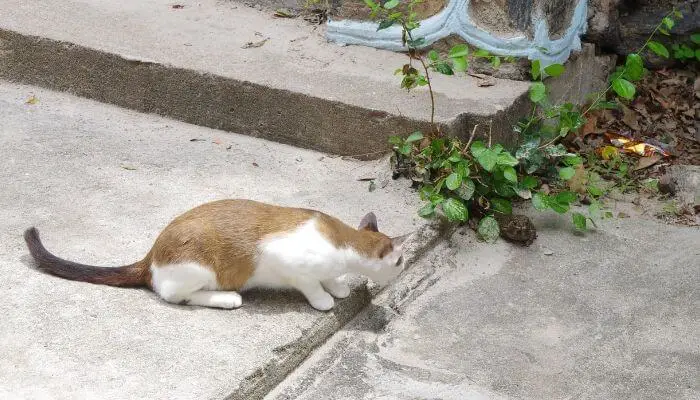
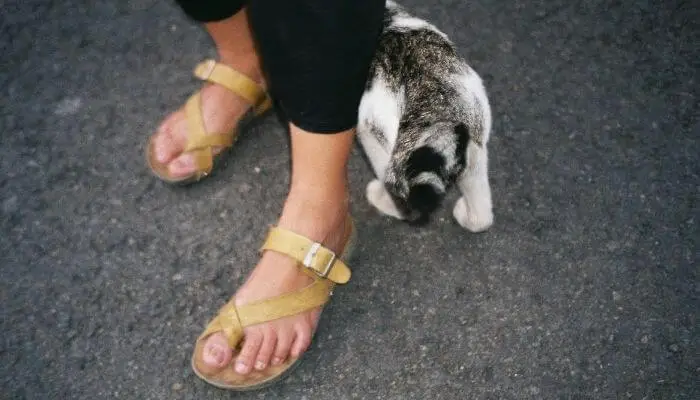
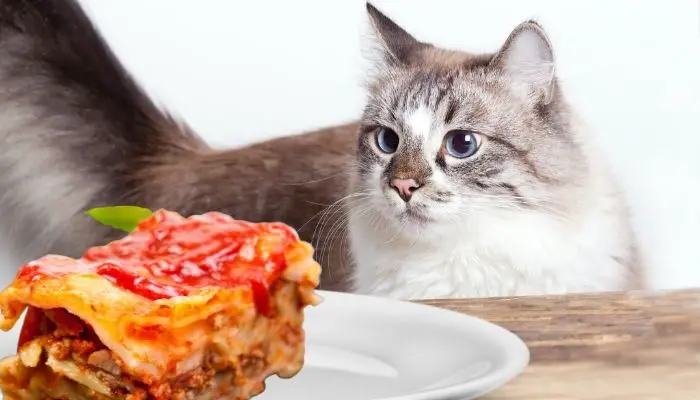
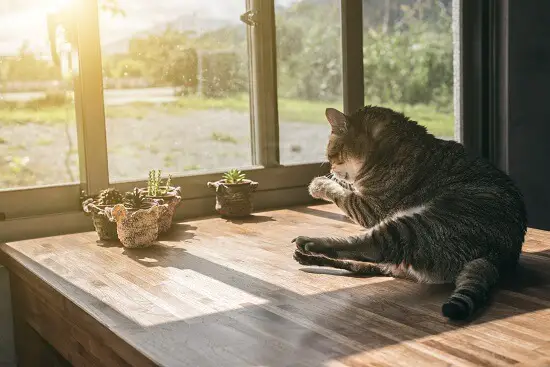

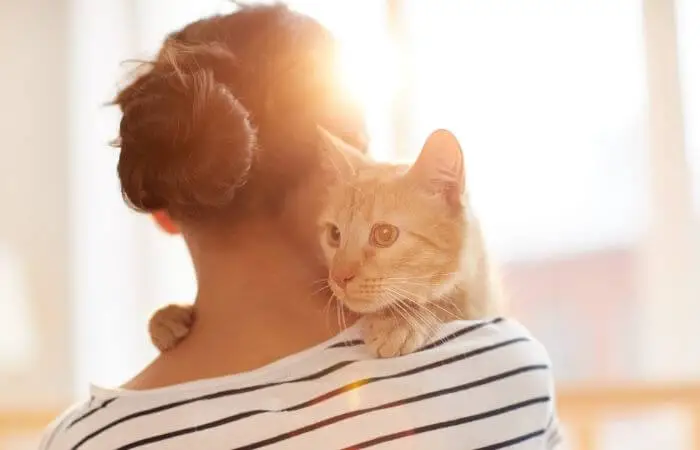
Leave a Comment